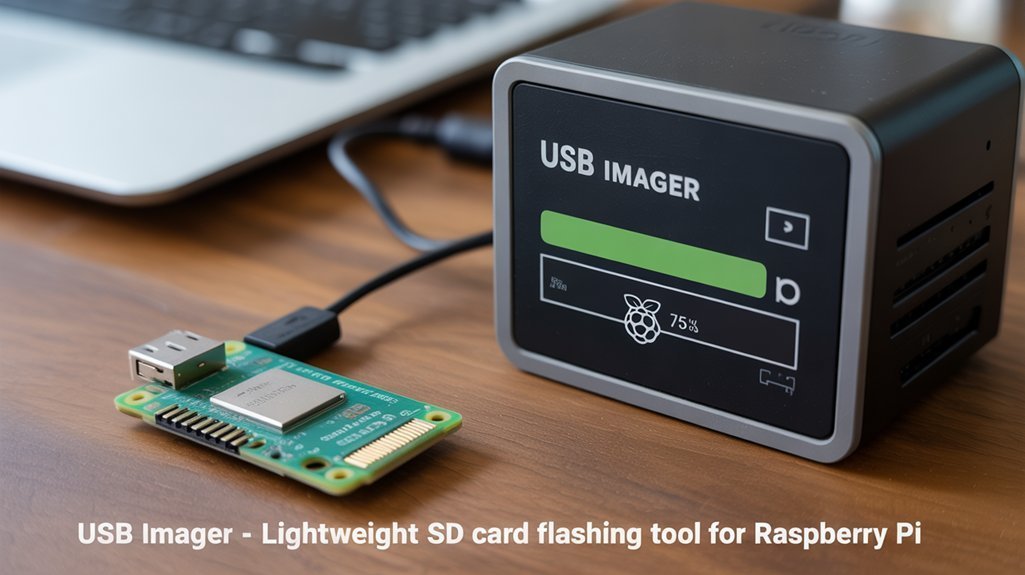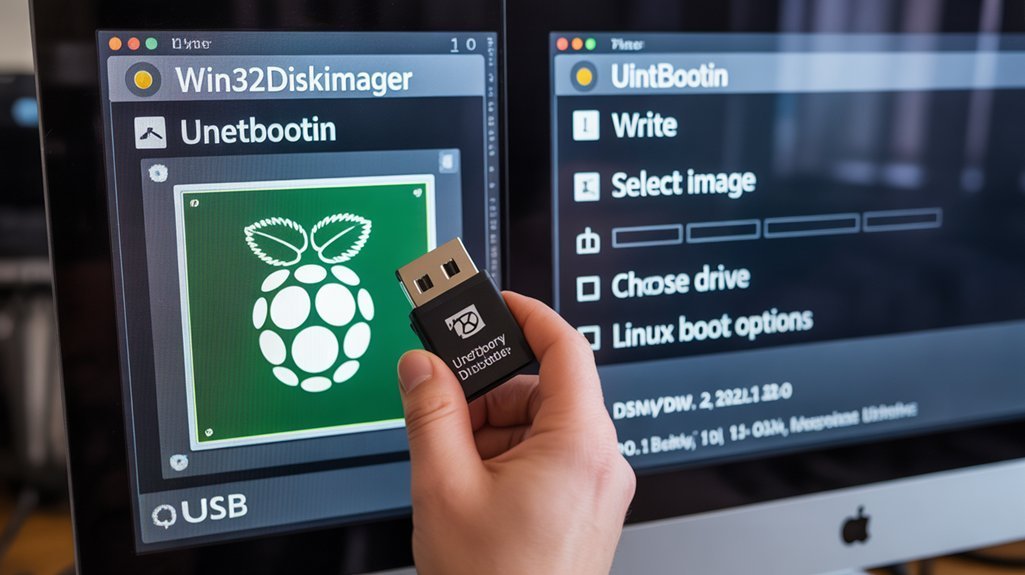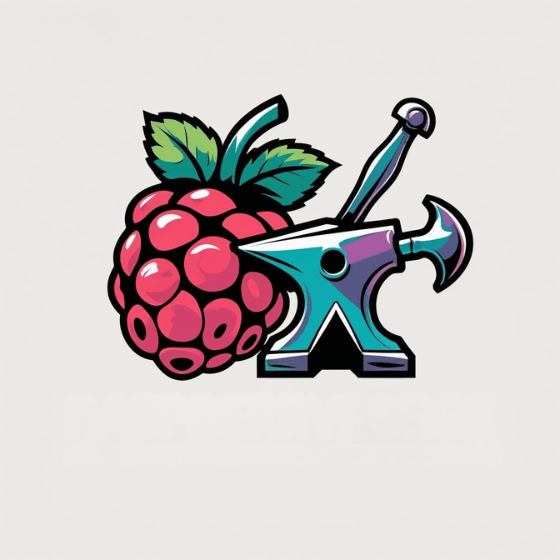Raspberry Pi Imager isn’t your only option when you need to create bootable USB drives for your projects. Behind this popular official tool lies a world of alternatives that offer unique advantages for different situations. In some of the Raspberry Pi Imager alternatives, you’ll find specialized features like multiboot capabilities, faster flashing speeds, and platform-specific optimizations that might better suit your workflow. Each tool brings its own approach to the seemingly simple task of writing an OS image to your storage device, and choosing the right one can save you significant time and frustration.
Key Takeaways
- BalenaEtcher offers cross-platform compatibility with a user-friendly interface and verification checks for creating Raspberry Pi bootable media.
- Win32DiskImager creates exact copies and performs image backups specifically designed for Raspberry Pi installations.
- USB Imager provides a lightweight alternative at under 256KB with support for multiple file formats.
- Rufus delivers high-speed flashing with extensive customization options for partition schemes and bootloader configurations.
- Ventoy allows creating multiboot USB drives that can hold multiple operating system ISOs on a single drive.
BalenaEtcher: Cross-Platform Simplicity for All Skill Levels
BalenaEtcher stands out as a powerful cross-platform solution for creating bootable media. You’ll appreciate its sleek, user-friendly interface that simplifies the flashing process through a single window design, regardless of your technical expertise.
Available for Windows, macOS, and Linux, this tool offers true cross-platform accessibility while supporting common image formats like ISO, IMG, and ZIP. The software automatically handles drive detection and implements verification checks before and after flashing to prevent corrupted media. The intuitive three-step process—select image, choose target, and click Flash!—makes bootable media creation effortless. This validated flashing process ensures you won’t end up with corrupted storage media.
For professionals, BalenaEtcher enables simultaneous flashing of multiple devices, with custom settings files for automation.
The open-source nature under Apache 2.0 license guarantees continuous improvements through community contributions, while keeping the experience advertisement-free and cost-free—perfect for both casual users and systems administrators.
Rufus: High-Speed Windows Solution for Bootable USB Drives
Few bootable USB creation tools rival Rufus when it comes to speed and efficiency for Windows users. This portable, open-source application excels at formatting and creating bootable drives faster than most competitors.
Rufus features include support for various ISO files, multiple file systems, and both BIOS and UEFI boot modes. You’ll appreciate its ability to verify image integrity through hash calculations and automatically download official Windows ISOs directly from Microsoft. Despite its powerful capabilities, the application remains remarkably small at just 1.34 MB size, making it ideal for carrying on a flash drive.
What sets Rufus apart is its extensive Rufus customization options. You can select partition schemes (GPT or MBR), optimize cluster sizes, and enable persistent storage for Linux distributions. The tool is especially valuable for users who need to create installation media for diverse platforms, as it supports Windows, Linux, and specialized systems like FreeDOS.
The straightforward interface offers both recommended defaults and advanced settings, making it accessible whether you’re a novice or power user.
USB Imager: Lightweight Option for Raspberry Pi Enthusiasts

For Raspberry Pi enthusiasts seeking a no-frills flashing solution, USB Imager stands out as an exceptionally lightweight alternative to the official Raspberry Pi Imager.
At just 192-256KB, it’s dramatically smaller than balenaEtcher’s 130MB footprint, making it ideal for portable USB flashing. The tool’s efficiency aligns with the cost-effective nature of Raspberry Pi, ensuring users can create bootable media without resource-heavy software.
You’ll appreciate its cross-platform compatibility across Windows, macOS, and Linux, offering a consistent experience without heavy frameworks.
USB Imager supports various formats including .img, .iso, and compressed files, while providing data integrity verification after writing.
Privacy-conscious users will value its open-source MIT license with no ads, trackers, or telemetry. The tool’s image verification capabilities ensure your bootable drives maintain complete integrity throughout the flashing process.
The streamlined interface simplifies the flashing process to essential steps: select image, choose device, write—perfect for both beginners and experienced Raspberry Pi developers.
Like many free and open-source alternatives mentioned, USB Imager provides an accessible option for users who want straightforward bootable media creation without unnecessary features.
Ventoy: Create Multiboot USB Drives for Multiple Operating Systems
Unlike standard imaging tools that focus on single-OS installations, Ventoy revolutionizes the USB boot process by enabling true multiboot functionality on a single drive.
You’ll appreciate its ingenious dual-partition architecture—a small hidden FAT partition housing the bootloader alongside an exFAT partition where you can simply drag-and-drop ISO files without reformatting.
The remarkable multiboot ease comes from Ventoy’s ability to automatically generate a boot menu displaying all your stored operating systems. Supporting both Legacy BIOS and UEFI boot modes, it’s compatible with Windows, Linux, BSD, and recovery utilities.
ISO management couldn’t be simpler—just copy files directly to the drive, even those larger than 4GB. For tech enthusiasts and IT professionals, Ventoy eliminates the need for multiple USB sticks while maintaining normal storage functionality on the same device. The installation process requires you to extract and run the downloaded Ventoy executable with administrative privileges before selecting your USB drive. The tool also provides persistence support for Linux distributions, allowing you to save changes across reboots.
Win32DiskImager and UNetbootin: Classic Alternatives for Image Writing

Long before flashier alternatives emerged, Win32DiskImager and UNetbootin established themselves as reliable workhorses in the image writing space.
Win32DiskImager excels at creating exact copies and performing image backup tasks, while UNetbootin specializes in bootable installations across multiple platforms.
- Win32DiskImager offers full drive read/write capability, making it ideal for Raspberry Pi SD cards and creating exact backups of your devices.
- UNetbootin provides cross-platform support (Windows, Linux, macOS) with a more intuitive interface for Linux distribution installations.
- Both tools are lightweight (5-12MB) compared to modern alternatives like Balena Etcher (140MB+).
When UNetbootin fails with certain Linux ISOs, Win32DiskImager often succeeds. Research shows that Win32DiskImager became a recommended alternative when unetbootin failed to properly create bootable Linux Mint USB drives.
Though lacking modern interfaces, these tools deliver reliable performance for specific imaging tasks.
Win32DiskImager performs sector-by-sector write operations for exact replication of your source images, ensuring nothing is lost in the process.
Frequently Asked Questions
Can Raspberry Pi Imager Alternatives Recover Data From Corrupted SD Cards?
These tools don’t directly recover data from corrupted SD cards, but they can help you create bootable drives with recovery environments that contain utilities for addressing SD card corruption.
Do Any Raspberry Pi Imager Alternatives Work Offline Without Internet Connection?
Like a self-sufficient toolkit, balenaEtcher, Rufus, and UNetbootin work completely offline. You’ll need pre-downloaded images for manual installations, but they offer robust configuration options despite network limitations.
Which Raspberry Pi Imager Alternative Has the Lowest Error Rate for Raspberry Pi?
Based on error rate comparison and tool reliability analysis, balenaEtcher offers you the lowest error rate for Raspberry Pi due to its validated burning process and built-in checksum verification capabilities.
Can I Create Password-Protected or Encrypted Bootable Drives for Raspberry Pi?
While standard Pi OS doesn’t prompt for passwords at bootup, you can create encrypted drives using LUKS encryption with password protection. For enhanced security, consider Zymbit’s HSM solution or hardware write-protected USB drives.
Are There Mobile Versions of Raspberry Pi Imager Alternatives Available for Android or Ios?
No mobile options exist for bootable USB creators on Android or iOS. App comparisons reveal mobile restrictions prevent USB writing functionality due to operating system limitations on raw device access.
Conclusion
You’ve discovered six powerful Raspberry Pi Imager alternatives, each offering unique advantages. But which one will truly transform your bootable USB experience? Will it be BalenaEtcher’s simplicity, Rufus’s speed, or perhaps Ventoy’s innovative multiboot functionality? The choice depends on your specific needs. Consider what matters most—compatibility, customization, or speed—before you commit to your next imaging tool.
